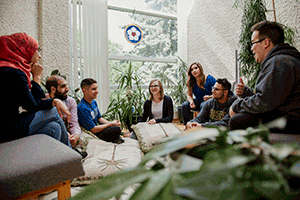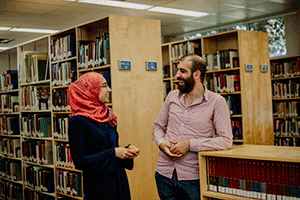Ready to learn more?
Get all the details straight to your inbox!

Luther College appeals to students who want to study in a safe, nurturing, and inclusive environment. We welcome students of all faiths, ethnicities, backgrounds, religions, genders, and sexual orientations.

Our student residence, The Student Village at Luther College, welcomes residents from ALL post-secondary institutions in Regina. Rooms come with a meal plan, free laundry, free wi-fi, and a great sense of community.

To enrol as a Luther College student, simply fill out the University of Regina application form and select Luther as your campus of choice.

Wondering where to live? Our student residence, The Student Village at Luther College, is considered a great choice for first-year student accommodation. Individual private rooms mean you can stick to your own schedule and you never have to deal with roommate hassles.

The Luther Library has over 24,000 items in its collection, 5,000 books checked out per year, and 7,000 students who come through its door per month.

Luther students can register in Arts, Science, or Media, Art, and Performance. Luther students are U of R students and receive a U of R degree.

Smaller class sizes at Luther College means more individualized attention and better connections with your professors, classmates, and academic advisors.

Luther College is recognized for its high standards of teaching, focused research, and one-on-one academic advising. We value and protect this heritage of excellence in scholarship, freedom of inquiry, and faithful seeking after truth.
Get all the details straight to your inbox!
By Lori Beaman
Let me begin by expressing my gratitude to Dorothy Lane, Mark Anderson and William Stahl for their engagement with the notion of deep equality and for pressing me to clarify further some of the ideas that surround this nascent concept. Space limitations mean that I can’t address in detail all of the very insightful comments, but there are several themes that I would like to develop.
Proposing deep equality as a potential conceptual springboard for negotiating religious difference is not intended to suggest that it can be either historically or presently universal. To project it into the past as a “what if we had had deep equality” musing is as wrong-headed as any exercise that imposes present day standards, language, and insight in a historically universal manner. Such ventures must be undertaken with care. Similarly, while the notion of deep equality may be able to be exported to other contexts, this too is a bit of a dangerous (never mind arrogant) exercise. Deep equality is certainly culturally bounded, in part by public understandings of difference, sameness and other in historical context (which are fluid), and in part by legal possibilities, such as that offered by the Canadian Charter of Rights and Freedoms (whose interpretation is also fluid). I’ve become painfully aware of the non-transportability of deep equality in the way I imagine it in the Canadian context when talking about it in the European context. As I reject tolerance and accommodation, scholars from Spain, Belgium and the Netherlands, for example, looked what can only be described as distraught. They have been fighting for accommodation. As the Belgian report Les Assises de l’Interculturalité and one of its authors, Marie-Claire Foblets, insists, Belgians have a duty to accommodate. This is seen in a positive way, as a perhaps radical step toward opening Belgian society to the ‘other’, who must be made to feel welcome. Once we examine Belgian culture more carefully, it may be that accommodation is exactly the right approach in that context at this time. Similarly, in the British context, Tariq Modood (2005) sees accommodation as a pragmatic approach that facilitates the achievement of equality.
Instead of seeing deep equality as a progression from tolerance, accommodation, formal equality, then substantive equality, and finally deep equality, might it be imagined as an alternative ethic that already exists but is not adequately foregrounded? John Gray cautions against utopian thinking (and I think this is partly what Mark Anderson is getting at with his critique of progressivist thinking) and his caution is well taken. But does this mean abandoning a quest to think about ways that justice, equality and fairness might be better realized? I hope not. Here it might be useful to revisit some of the works that have shaped (and perhaps caused) my preoccupation with deep equality. Experiencing the inadequacies of law first hand (I practiced for 5 years) as a mechanism for the achievement of anything that remotely resembles justice has firmly convinced me that while law can play an important role, thinking about justice requires a move beyond law, or a holding it in tension with everyday practices, understandings and ethics. The works that have most influenced me are those by feminist economists JK Gibson-Graham (1996, 2006) (two scholars who wrote under one name), whose work focuses on community-based solutions in a capitalist world. Ruth Morris worked and lived prison abolition (1995). She argued that an ethic of misery justice pervades social life and our ideas of justice and that translates into a “if I can’t have it, neither should you” type of thinking that is essentially destructive to the human spirit. Frances Westley, Brenda Zimmerman and Michael Quinn Patton’s Getting to Maybe: How the World is Changed came from the business world and emphasized the importance of uncertainty in creating sustainability and positive change. It roughly intersected with my seeing South African artist William Kentridge’s exhibition at the Montreal Museum of Contemporary Art. One of his animated films, Tide Table (2003), and his emphasis on uncertainty as creating the conditions for knowledge illuminated for me the complex, contradictory and uncertain ways that justice is hoped for. Finally, the work of political theorist William Connolly (2002), especially his notion of agonistic respect and his insistence (contra, for example, Charles Taylor) on immanence for me have emphasized the desirability, and the difficulty, of realizing deep equality and signaled that it is as much about process as it is about result. And probably, above all, deep equality is not ‘nice’. These are pieces I have encountered during the course of the last 15 years, at different moments, and for unrelated reasons. Yet, each of them has contributed to not only my expression of dissatisfaction with the present ‘equality order’, but my desire to not rest in criticism (despite my postmodernist leanings) but to attempt to recover positive narratives, especially in the everyday world, in order to reconstitute equality in a different way.
While I take heart from both Lane and Stahl’s suggestion that deep equality, at least as I’ve written about it thus far, does not go far enough, even since writing this piece I have begun to worry that it is going too far. By this I mean that in the current context it is so far from the realm of possibility that there is no, or a very small, platform on which it can be received. We are not, to say the least, in a culture of any sort of notion of substantive equality. Formal equality, or the idea of sameness (not similarity), particularly around ‘Canadian values’ (which some seem to be better placed to identify than others), is rapidly regaining a foothold. For Lane and Stahl, an important missing element is economic inequality. Since my attention has been focused on the negotiation of religious difference I have isolated that out for analysis. But Lane and Stahl are absolutely correct—any achievement of deep equality at a societal level must extend beyond a myopic attention to religion to address the material conditions in which people live, and the injustices created by global capitalism. Certainly this has been the focus of Gibson-Graham in their work, which has, as mentioned above, inspired my thinking on deep equality. Perhaps in this light we might imagine the occupy movement as an economic social movements piece of deep equality, and the Arab spring as a political order social movements piece. Both are located in the realm of the popular, which supports my hunch that it is by more closely examining the everyday lived negotiation of difference and similarity that we will recover a narrative of deep equality. And it is ultimately this location—within popular movements and everyday life, rather than exclusively in the letters of law and policy—that may offer deep equality some protection from being overtaken by “legitimating” discourses.
Canadian Charter of Rights and Freedoms, R.S.C, 1985 Appendix II, No. 44 see also: Part I (ss. 1 to 34) of the Constitution Act, 1982.
Connolly, William E. 2002. Neuropolitics: Thinking, Culture, Speed (Theory Out of Bounds). Minneapolis: University of Minnesota Press.
Foblets, Marie-Claire et Christine Kulakowski. 2010. Les Assises de l’Interculturalité 2010. edited by M. d. l. E. e. d. l. É. d. Chances. Bruxelles.
Gibson-Graham, JK. 1996. The End of Capitalism (As We Knew It): A Feminist Critique of Political Economy. Oxford: Blackwell Publishers
———. 2006. A Postcapitalist Politics. Minneapolis: University of Minnesota Press
Kentridge, William. 2003. Tide Table. http://www.youtube.com/watch?v=IJ-c4N2njwg
Modood, Tariq. 2005. Multicultural Politics: Racism, Ethnicity, and Muslims in Britain. Minneapolis: University of Minnesota Press.
Morris, Ruth. 1995. Penal Abolition, the Practical Choice: a practical manual on penal abolition. Toronto: Canadian Scholars’ Press.
Westley, Frances, Brenda Zimmerman and Michael Quinn. 2006. Getting to Maybe: How the World is Changed. Toronto: Vintage Canada.